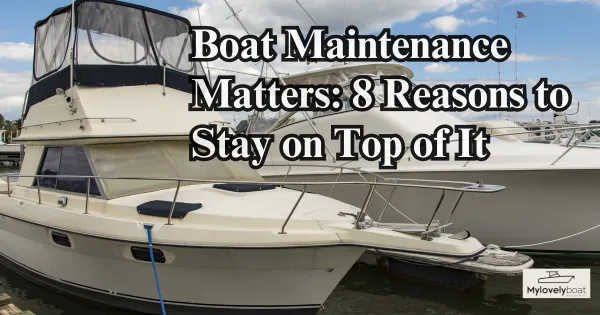
Proper boat maintenance is essential for ensuring safety, performance, and longevity.
Regular upkeep prevents costly repairs, enhances fuel efficiency, and minimizes the risk of accidents on the water.
Whether you’re a seasoned sailor or a novice, understanding the importance of maintenance can lead to a more enjoyable and worry-free boating experience.
This article explores the top reasons why maintaining your boat is not just a chore, but a vital investment in your maritime adventures.
Key Takeaways
- Regular maintenance prevents costly repairs and enhances safety.
- Proper upkeep improves fuel efficiency and performance.
- Maintenance helps retain the boat’s market value.
- Neglecting maintenance can lead to accidents and breakdowns.
- A well-maintained boat ensures a better overall experience on the water.
Maintain a Boat In At the Right Time
The worst time to find out something is wrong with the boat is when it is out on the open sea. Your clients can prevent unpleasant surprises by performing periodic upkeep and repair, especially on older vessels.
Keeping a boat in top condition will also reduce the risk of accidents, injuries, and deaths. An estimate reveals that proper maintenance can prevent eight percent of boat-related accidents and four percent of deaths. This is a good enough reason for your clients to take care of their watercraft.
Top 8 Reasons Why Proper Boat Maintenance is Essential
Safety:
The foremost reason for routine boat maintenance is to ensure that all boat components are functioning correctly. Ensuring that all boat components are functioning correctly significantly reduces the risk of accidents and emergencies on the water. Regular checks on the engine, hull integrity, safety gear, and electronic equipment can prevent potentially life-threatening situations. Proper maintenance keeps the vessel reliable, ensuring a safe outing for everyone on board.
Longevity:
Regular upkeep and preventative maintenance extend the lifespan of your boat. Boats are substantial investments, and just like cars, they require consistent care to prevent degradation over time. By addressing minor issues before they escalate into major problems, you can avoid costly repairs in the future. Keeping the boat in optimal condition can also preserve its resale value should you decide to upgrade or sell in the future.
Performance:
A well-maintained boat operates at its best. Regular engine tune-ups, hull cleaning to prevent drag, and propeller checks ensure that your boat is performing efficiently. Improved performance leads to better fuel economy, saving money in the long run. Additionally, a boat that is in top condition offers a smoother, more enjoyable ride.
Environmental Protection:
By maintaining your boat, you help protect the environment. Leaks or spills of oil and fuel, emissions from poorly tuned engines, and the release of invasive species through uncleaned hulls can all have detrimental effects on marine ecosystems. Routine maintenance helps minimize your ecological footprint, contributing to the conservation of the waterways for future generations.
Compliance and Insurance:
Regular maintenance ensures that your boat complies with local and international maritime regulations, which can change over time. Compliance is not only about avoiding fines but also about contributing to the overall safety and sustainability of water bodies. Furthermore, many insurance policies require regular maintenance as part of their terms. Failing to maintain your boat can lead to insurance claims being denied, leaving you financially vulnerable in the event of an accident or damage.
Cost Efficiency:
Routine maintenance can significantly reduce the overall operating costs of owning a boat. Catching and addressing minor repairs early on can prevent them from turning into more severe, costly issues down the line. Components like the engine or the boat’s electrical system can be expensive to replace but can last much longer with regular care, making maintenance a wise financial decision in terms of long-term ownership costs.
Enhanced Resale Value:
A well-maintained boat retains its value much better than one that has been neglected. Keeping up with regular maintenance schedules, documenting repairs, and attending to both the cosmetics and mechanics of your boat can make a significant difference when it comes time to sell. Prospective buyers are more likely to pay a higher price for a boat that is in excellent condition, providing proof that the vessel has been properly cared for.
Peace of Mind:
Knowing that your boat is in top working condition provides peace of mind, allowing you and your passengers to relax and enjoy your time on the water. The reassurance that comes from having conducted all necessary checks and maintenance tasks means you can focus on the enjoyment of boating, rather than worrying about potential breakdowns or issues while out on the water. This confidence contributes to a much more pleasant and stress-free boating experience.
Conclusion
Maintaining your boat is not just about aesthetics; it’s a critical aspect of safe and enjoyable boating. Regular maintenance protects your investment, enhances performance, and reduces the risk of accidents. By prioritizing upkeep, you ensure that your boating experiences remain enjoyable and trouble-free for years to come.
FAQ
Why is boat maintenance important?
Boat maintenance is crucial for safety, performance, and longevity. It helps prevent costly repairs, improves fuel efficiency, and reduces the risk of accidents while on the water.
How often should I perform maintenance on my boat?
Regular maintenance should be performed according to the manufacturer’s recommendations and your specific usage patterns. Generally, a thorough check-up is advised at least once a year.
What are common maintenance tasks for boats?
Common tasks include engine servicing, hull cleaning, checking the electrical system, inspecting safety equipment, and maintaining the fuel system.
What happens if I neglect boat maintenance?
Neglecting maintenance can lead to mechanical failures, decreased performance, increased fuel consumption, and a higher risk of accidents or injuries.
Can I perform maintenance myself?
Many maintenance tasks can be performed by boat owners, such as cleaning and basic inspections. However, complex tasks, especially those involving the engine or electrical systems, may require professional assistance.





